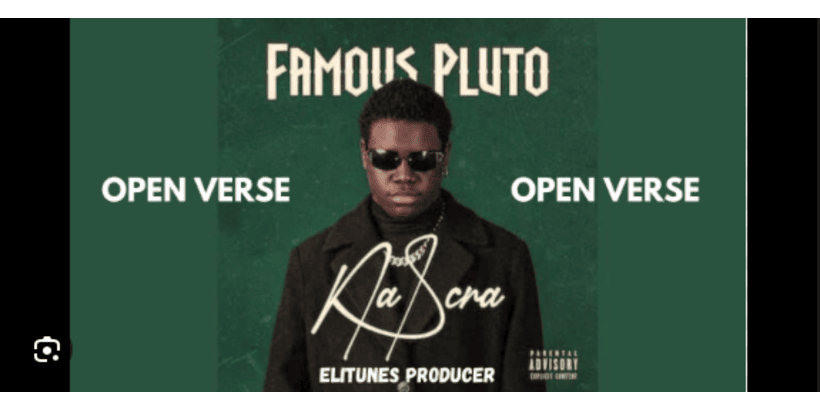Famous Pluto’s Na Scra is a vivid, brash, and unapologetically raw anthem that blends street slang, braggadocio, and a sense of gritty realism to paint a picture of fast living in the trenches of modern Nigerian youth culture. Through its minimalist beat and trap-influenced delivery, Na Scra presents a lifestyle shaped by hustle, temporary highs, quick money, and reckless abandon. The song is less about structured storytelling and more about a mood—a manifesto of survival, indulgence, and fleeting relevance.
The first verse kicks off with a tone of urgency and street wisdom: “I nor dey waste time / Okay, make I just go straight.” This is a lyrical signal that we’re diving into a no-nonsense perspective. Famous Pluto isn’t dressing his message up in metaphor—he’s diving straight into the deep end of street hustle and coded ambition. The line “One round plus one round equals to two bone straight” is humorous but layered. “Bone straight” is not just a hairstyle coveted by many women in Nigeria—it’s also a symbol of status. This punchy lyric serves as both a cheeky reference to sexual stamina and the transactional nature of modern relationships, where rounds in bed are equated with material returns.
“No long talk, send advice go my Palmpay” continues the theme of brevity and business. Palmpay, a mobile payment platform, represents the digital hustle—the quick exchange of cash, advice, or favours. The mention of “fifty-fifty” suggests a loyalty among peers, but in a broader sense, it underscores a type of egalitarian code within the streets: everyone eats or nobody eats.
There’s a bitter truth embedded in the line: “Money nor dey, your serious babe go pick race.” This is a social observation with a sting. In the absence of wealth, loyalty dissolves—especially in romantic relationships. Famous Pluto doesn’t mourn this; he just states it with a shrug, like a hardened narrator who’s seen too much. His words mirror the harsh economic and emotional realities of a generation chasing status with limited means. His tone is streetwise and self-assured, yet loaded with undertones of disillusionment.
The chorus, built around the repeated chant “Na scra,” is the heartbeat of the song. “Na scra” is Nigerian street slang that loosely translates to “it’s all madness,” “it’s messed up,” or “it’s all rough.” It’s a blanket term for the reckless, often absurd cycles of hustling, flexing, and chasing fleeting pleasures. Each line that follows this refrain is an episodic snapshot from this chaotic lifestyle: carrying money, drinking cheap bitter liquor, having casual sex, fleeing from consequences, catching flights, and blowing money at nightclubs like Quilox. There’s a dizzying energy in these lines, reflecting a lifestyle where highs are temporary and tomorrow is uncertain.
“Give her belle run” (get a girl pregnant and disappear) is particularly jarring. It’s callous, but that’s the point—the song doesn’t sugarcoat. It amplifies the nihilistic aspects of this fast-paced lifestyle where even major consequences like pregnancy are brushed off. There’s no room for guilt or accountability here, only motion.
Then comes the line: “If the money too much / I go finish am for Quilox.” Quilox is a high-end Lagos nightclub synonymous with celebrity excess and flamboyance. To “finish money” there is a badge of honour, a performance of wealth even when that wealth is borrowed or temporary. In this context, wealth is not to be saved—it’s to be spent as a declaration of status, no matter how short-lived.
The post-chorus introduces a surreal yet telling juxtaposition: “(Their father) Cybertruck / (Normal gbosa) Elon Musk.” These references to Western innovation and luxury (Tesla’s Cybertruck and billionaire Elon Musk) contrast sharply with the chaos of the preceding lines. The metaphorical reach here is interesting—Famous Pluto isn’t just flexing local status; he’s tying his aspirations to global icons. Elon Musk becomes a stand-in for unattainable wealth and success, something to aspire toward even while drowning in “scra.” The line “The lifestyle too cost” then lands like a punchline—it’s all too expensive, too consuming, too unsustainable. Yet, they chase it anyway.
In the second verse, Famous Pluto doubles down on his grimy realism. “Na to lodge one babe, give am missionary / The words I dey speak, nor dey dictonary” brings back the unfiltered sexual themes, now paired with a kind of poetic arrogance. He speaks a language that isn’t in the dictionary—slang, pain, street knowledge. It’s a statement of cultural pride and defiance. The line “Uzama na Zee World extraordinary” adds a comedic twist, likening his drama-laden escapades to melodramatic soap operas aired on Zee World, a popular TV station in Nigeria. It’s self-aware and tongue-in-cheek, a rare moment of levity amid the lyrical grit.
“Waka waka, dey Abraka and Warri / Next day, you don see me for Ilorin” maps his movement across various Nigerian cities. There’s no anchor—only drift. Like a fugitive of fortune, he’s everywhere and nowhere. The unpredictability and instability of this life—always on the move, always escaping something—is laid bare here.
The second chorus re-emerges like a reminder of the cycle. It’s the same chant, the same events replayed—money, women, flight, hotel, escape. The repetition isn’t lazy; it’s intentional. It reflects the loop of this lifestyle: different days, same madness. Nothing really changes, but everyone is pretending they’re leveling up.

Finally, the outro brings us back to the earlier refrain: “Cybertruck… Elon Musk… The lifestyle too cost.” This repetition anchors the song in a kind of ironic commentary. Despite the flashy references and the performative success, the takeaway is clear: this lifestyle, with all its indulgence, is expensive—not just financially, but spiritually and emotionally.
In Na Scra, Famous Pluto isn’t just telling a story; he’s laying out a code of existence. It’s chaotic, misogynistic, funny, dark, and ultimately a product of its environment. There is no polished message, no redemptive arc. Instead, what we get is a raw, hyper-local expression of youth in survival mode—caught between aspiration and entropy. The beauty of the song lies in its brutal honesty. It doesn’t glorify or condemn—it just observes and documents, like a camera panning across a never-ending Lagos night.
Added by
Lyricssphere
WRITE A COMMENT
WRITE A COMMENT


No comments yet